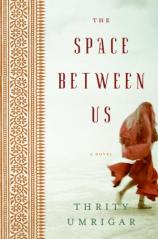The Space Between Us
Review
The Space Between Us
THE SPACE BETWEEN US is a musing on the bond between two modern-day Bombay women: Sera and her long-time servant, Bhima. Their union is tested again and again, frayed by Bhima's servile role, by Sera's educated, middle-class Parsi upbringing, and by the deeply-sown seeds of bigotry and class prejudice that rank Bhima as less than human.
We see Sera struggle to overcome her class bias and we grit our teeth with frustration when she admits that the thought of Bhima sitting on her furniture, sleeping in her house and using her utensils makes her shudder. Umrigar masterfully depicts the paradox of Sera's desire to strengthen her bond with Bhima --- to help her and her family --- with her uneasiness as Sera is dragged further and further down into the muck and bog of Bhima's life, her world of filthy slums and political indifference.
From the moment Bhima awakens on her thin mattress and Sera smiles tearfully over the onions on the chopping block of her sun-lit kitchen, we are absorbed in the polar, harshly contradictory lives of these women. There is clarity and simplicity in Umrigar's style as well as a devotion to detail. Each description, murmur of dialogue and turn of phrase rings sharply. We can see the worlds she describes through each woman's distinctive gaze.
The parallels of Bhima's and Sera's life are dealt with subtly; indeed there is nothing heavy-handed or melodramatic about this novel. Despite the weight of the themes --- race, class, gender, sexuality and culture --- Umrigar never lets the prose slip into tired clichés or familiar sentiments. We see the squalor of Bhima's existence; we feel her rage and helplessness as she stands over her pregnant, doomed granddaughter as acutely as we smell Sera's onions simmering in the hot oil of the frying pan. The lives of these women are rendered vividly, without bias, by a narrator who easily slips behind the curtain of her words. Umrigar the author virtually disappears, achieving a kind of omniscience that only the best writers can hope for, allowing readers to witness the flaws and beauty of both these women and make their own judgments.
Strong and startling images punctuate the text --- from the charred black rope, woven with bitterness and resentment, that uncoils itself within Sera as she looks on her stepmother, to the face of the balloon seller who once delighted and fascinated Bhima and her husband, the memory of whom haunts her still.
We see Bhima betrayed time and time again --- by her family, by the government, by men who claim authority and take advantage of her trust and lack of education, by her aging body and her once-trusting spirit. Yet she possesses a dazzling, almost blinding conviction that there are sparks and pockets of pure goodness in the world, and Sera shines brightly in her eyes.
That is why the final climactic betrayal of the book is wrenching. Bhima has risen above so much and yet this final betrayal may be the wound that will not heal, festering and infecting her body with a vile, justified rage at the unfairness of her life --- a rage that will destroy her in the end. This book will keep readers up nights, absorbing them in the sights and sounds of Bombay, the struggles of its central characters, and the flashes and glints of the peripheral characters: Sera's daughter Dinaz, her son-in-law Viraf, Bhima's granddaughter Maya, and the ghosts of both women's husbands that still haunt their memories.
Readers will turn the last page reluctantly and remember the turns of Umrigar's prose long after they have retired the book to their bookshelves, both for its expertly woven narrative by a writer with a masterful ear for dialogue and description and its meditation on attraction and friendship, no matter how seemingly insurmountable the differences are. THE SPACE BETWEEN US reveals the power of coming together and the tragedy of breaking apart.
Reviewed by Jennifer Krieger on December 31, 2005
The Space Between Us
- Publication Date: January 1, 2006
- Genres: Fiction
- Hardcover: 336 pages
- Publisher: William Morrow
- ISBN-10: 0060791551
- ISBN-13: 9780060791551










